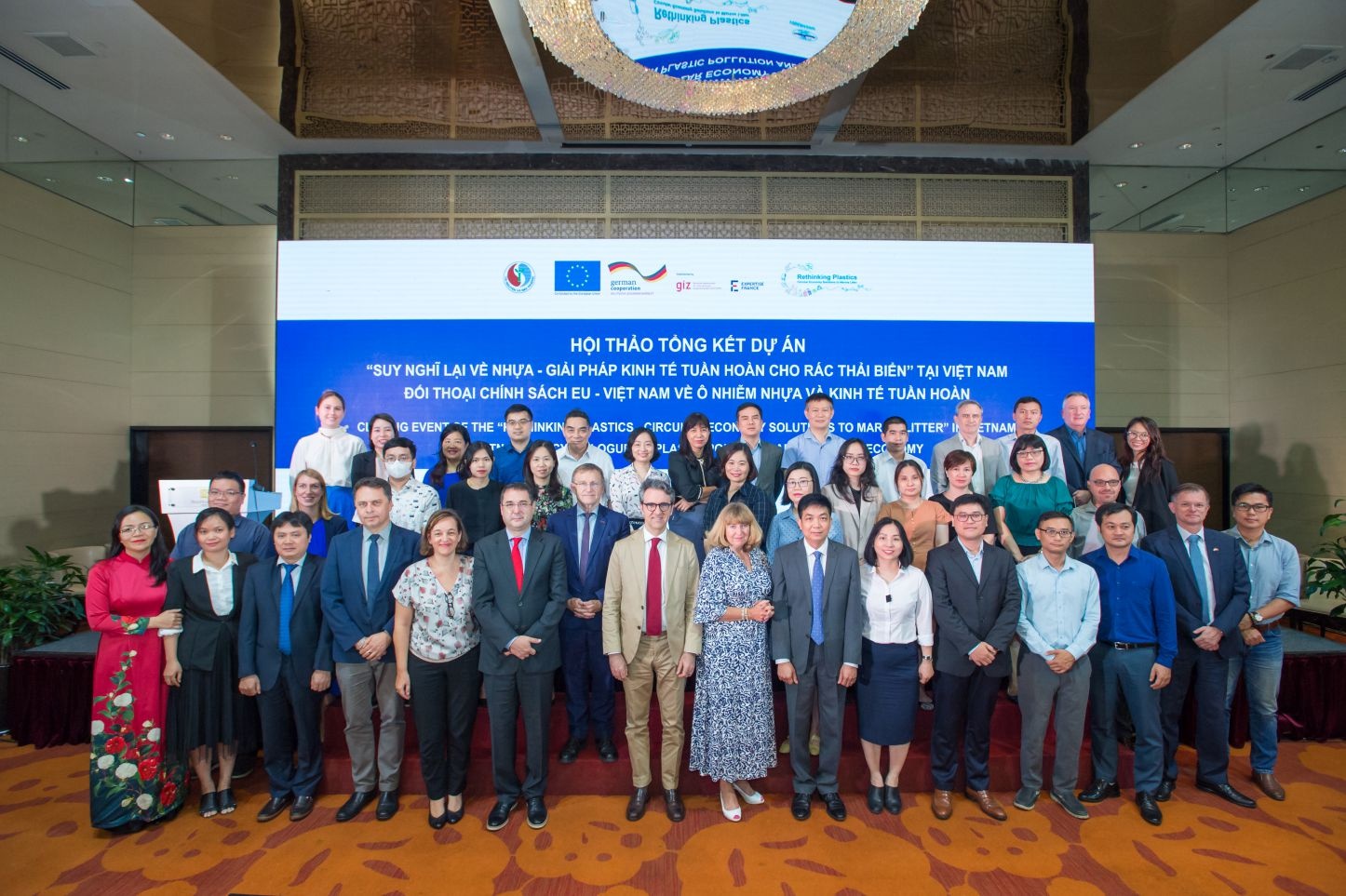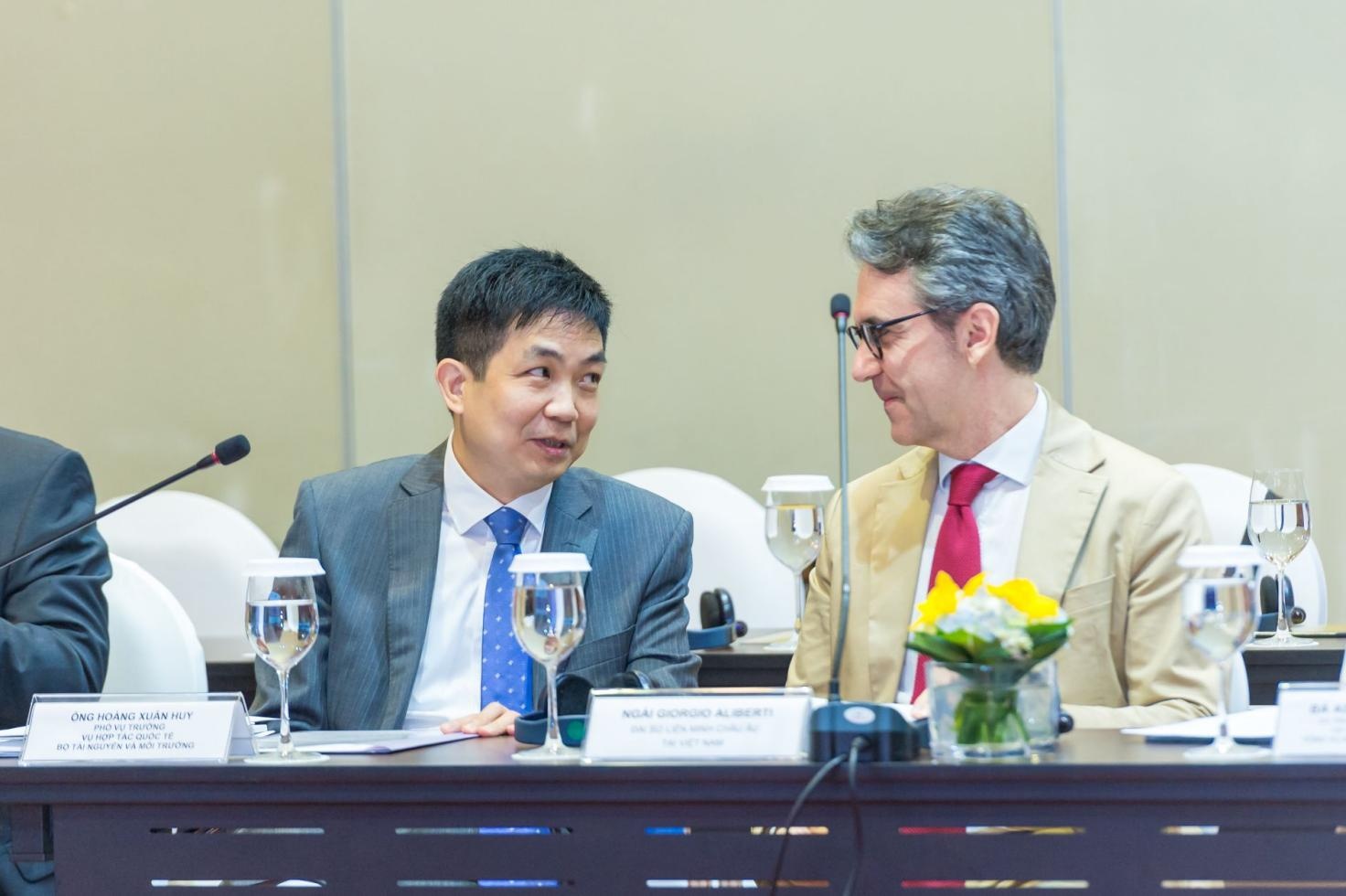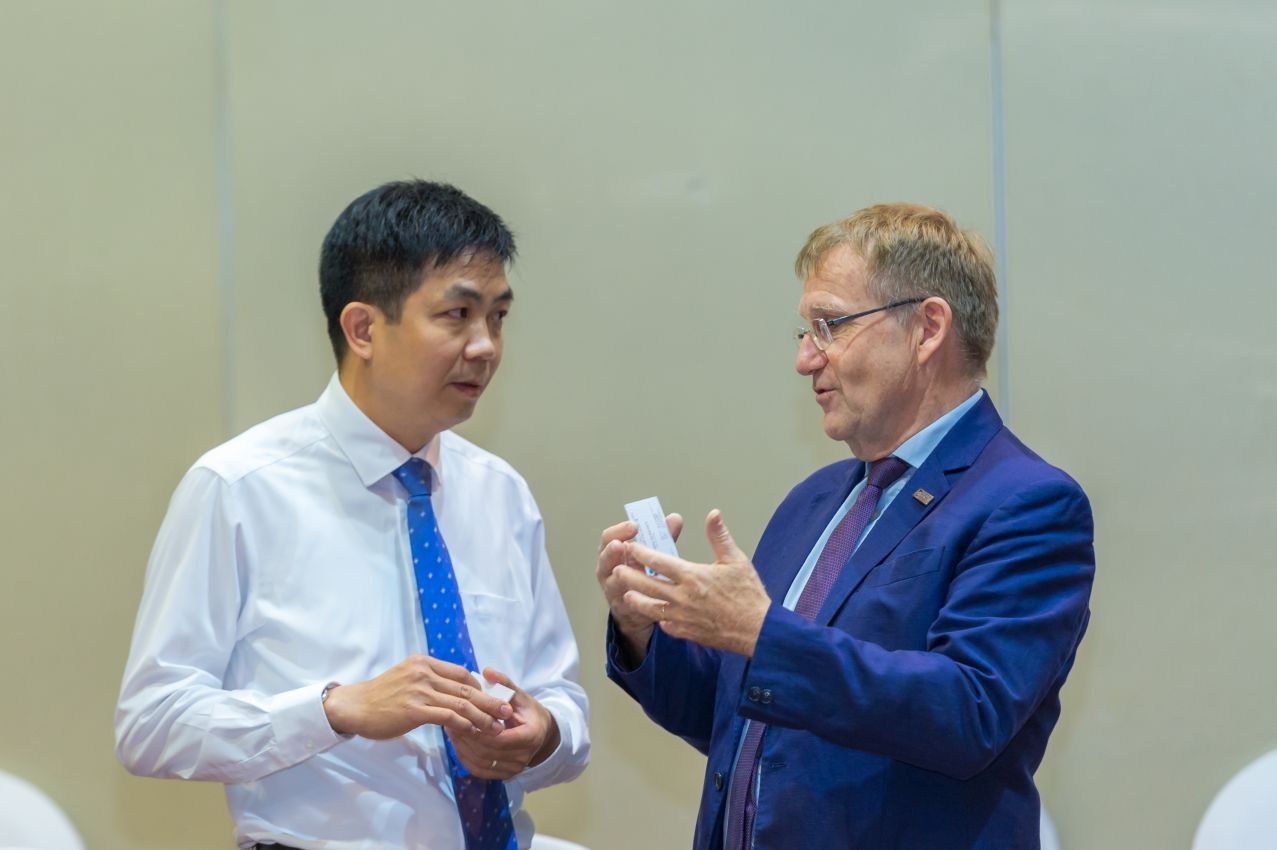Closing event of Rethinking Plastics heralds new age of combatting plastic pollution
At the event, participants concluded the implementation of Rethinking Plastics’ four pilot projects in sustainable consumption and production of plastics, plastic waste management on land and sea, as well as awareness-raising activities.
The event also aimed at enhancing the policy dialogue between the EU and Vietnam on plastic pollution, the transition to a circular economy, and publicly closed the activities of the Rethinking Plastics project in the country.
In Vietnam, the project – financed by the EU and the German Federal Ministry for Economic Cooperation and Development – cooperated closely with MoNRE and other ministries and partners since 2019 to develop regulatory frameworks and concrete actions to avoid, reduce, and better recycle plastics.
 |
| The Closing Event of the Rethinking Plastics saw the participation of high-ranking officials from the EU and Vietnam, as well as stakeholders that cooperated towards the success of the project |
Giorgio Aliberti, EU Ambassador of the European Union to Vietnam emphasised the importance of the Rethinking Plastics project at the conference saying, “Plastic is everywhere. It is versatile and very useful but plastic waste often ends in rivers and oceans. The coastal and marine environment of Vietnam is home to millions of species which are not only important for the ecosystems but also for human livelihood. Marine pollution poses a great risk to the marine environment as a lot of plastic waste is not properly disposed of, collected, and managed and often lands in the environment and the ocean.”
In Vietnam, following the revision of the Law on Environmental Protection (LEP) in 2020, new provisions anchoring waste management to the process of the circular economy are being implemented such as plastic waste reduction, waste sorting obligations, and the Extended Producer Responsibility (EPR) policy, Aliberti explained.
“Together with the National Action Plan for Management of Marine Plastic Litter by 2030 and the National Action Plan on Sustainable Production and Consumption for the 2021-2030 period, these policy and regulatory frameworks demonstrate the commitment of Vietnam to tackle plastic pollution, and I am very glad that we were able to contribute to this process with EU expertise, capacity building, and knowledge sharing, especially on EPR.”
 |
| Hoang Xuan Huy, Deputy Director of the Department of International Cooperation under MoNRE (left) and Giorgio Aliberti, EU Ambassador of the European Union to Vietnam |
Concerted EU-Vietnam endeavour
Astrid Schomaker, Director for Green Diplomacy and Multilateralism at the Directorate General Environment of the European Commission confirmed in an interview preceding the event with VIR, “Vietnam is now a model for EPR implementation in the region and I know that other countries are following the developments very closely.”
Schomaker added, “With its current policies, especially the EPR Decree in the LEP and the latest approval of the Circular Economy Development Scheme, Vietnam is an essential dialogue partner for us now and in the future, as we are also jointly supporting a legally binding global agreement on plastic pollution, as declared at the resumed session of the United Nations Environment Assembly (UNEA 5.2) earlier this year.”
At the conference, Schomaker emphasised the crucial role of the historic decision at UNEA 5.2 in March, where the heads of state, ministers of environment, and other representatives from UN Member States endorsed the resolution to forge an international legally binding agreement by 2024 to address the full lifecycle of plastic, including its production, design, and disposal.
“The problem of marine litter and plastics in the environment is so serious that the many individual efforts and commitments – as helpful as they are – do not even collectively achieve enough to curb the marine litter crisis,” Schomaker said at the event.
Although the agreement and its success will be vital for the global efforts to break the plastic wave, Schomaker pointed out, “It is also crucial that we don’t just negotiate for the next two years and wait with our action but continue to act as we have before and work with all stakeholders […] and address the problem of marine litter.”
Time to rethink plastics
This is exactly what the Rethinking Plastics project has been focusing on during the last three years since its launch in 2019 on a regional level. The project’s support and 24 pilot activities were defined and implemented in close cooperation with national and local partners in China, Indonesia, the Philippines, Thailand, and Vietnam – as well as to a more limited extent in Japan and Singapore. In this framework, all its stakeholders concentrated their efforts on the transition to a circular economy through plastic waste prevention and management.
Alvaro Zurita, team leader of the Rethinking Plastics project, summarised in his presentation at the event the achievements of the project, as well as the lessons learnt. Some of the mentioned milestones include EPR development and training in China and Vietnam, the efforts of 150 fishing boats that joined Fishing for Litter activities, more than 40 dialogue and exchange events, and improved waste management schemes for around 130,000 people, along with countless publications and recommendations for national stakeholders.
“We are now in the phase of summarising the lessons learnt, of which there will be a publication. We are also conducting a webinar series until July 6,” Zurita announced.
During its time in Vietnam, the Rethinking Plastics team supported four pilot projects that were encompassing the enhancement of plastic packaging collection, sorting, and recycling – including the improvement of conditions for informal waste workers; the establishment of an alliance of supermarkets to reduce the consumption of single-use plastic bags; ship waste management in Vietnamese ports; and the scheme for the voluntary collection of marine litter by the fisher community, aka Fishing for Litter; along with awareness-raising campaigns such as the Plastic Beast campaign in Ho Chi Minh City.
The Rethinking Plastics team worked in Hanoi, Ho Chi Minh City, and Phu Yen province with four of Vietnam’s ministries – the Ministry of Industry and Trade, the Ministry of Transport, the Ministry of Agriculture and Rural Development, and the MoNRE.
Besides these, the project’s members established an entire ecosystem of partners, including national and local administrations, academic and research institutions, private sector units, and NGOs and other professional organisations.
Hervé Conan, country director at Expertise France highlighted at the closing event, “I believe that it is a strength of this project that it has succeeded in creating the collective dynamic between the various actors, both at national and local levels.”
 |
| Hervé Conan, country director at Expertise France (right, here with Hoang Xuan Huy), emphasised the particularly important role of the Rethinking Plastics national and local partners in Vietnam |
Conan also emphasised the contribution of the Rethinking Plastics project to the elaboration of the legal framework and capacity dialogue on EPR. “The development of the EPR framework is a good example of the approach taken for the political dialogue. It has integrated the lessons of European experiences, some in-depth technical expertise, and feedback from the pilot projects that were carried out – but also the mobilisation of the private sector via a national platform created by the MoNRE,” Conan said.
In his closing remarks, Hoang Xuan Huy, deputy director of the Department of International Cooperation under the MoNRE remarked that despite the many challenges the project team faced during the implementation, “its contributions lay a solid foundation for MoNRE to work with other ministries and agencies to implement the National Action Plan for Management of Marine Plastic Litter by 2030.”
Moreover, Huy said, “The models and best practices from this project will be fed into our policies and regulations and replicated to minimise marine litter in Vietnam, contributing to solving the global challenge.”
What the stars mean:
★ Poor ★ ★ Promising ★★★ Good ★★★★ Very good ★★★★★ Exceptional
 Tag:
Tag:
Related Contents
Latest News
More News
- Bac Ai Pumped Storage Hydropower Plant to enter peak construction phase (January 27, 2026 | 08:00)
- ASEAN could scale up sustainable aviation fuel by 2050 (January 24, 2026 | 10:19)
- 64,000 hectares of sea allocated for offshore wind surveys (January 22, 2026 | 20:23)
- EVN secures financing for Quang Trach II LNG power plant (January 17, 2026 | 15:55)
- PC1 teams up with DENZAI on regional wind projects (January 16, 2026 | 21:18)
- Innovation and ESG practices drive green transition in the digital era (January 16, 2026 | 16:51)
- Bac Ai hydropower works stay on track despite holiday period (January 16, 2026 | 16:19)
- Fugro extends MoU with PTSC G&S to support offshore wind growth (January 14, 2026 | 15:59)
- Pacifico Energy starts commercial operations at Sunpro Wind Farm in Mekong Delta (January 12, 2026 | 14:01)
- Honda launches electric two-wheeler, expands charging infrastructure (January 12, 2026 | 14:00)






















 Mobile Version
Mobile Version